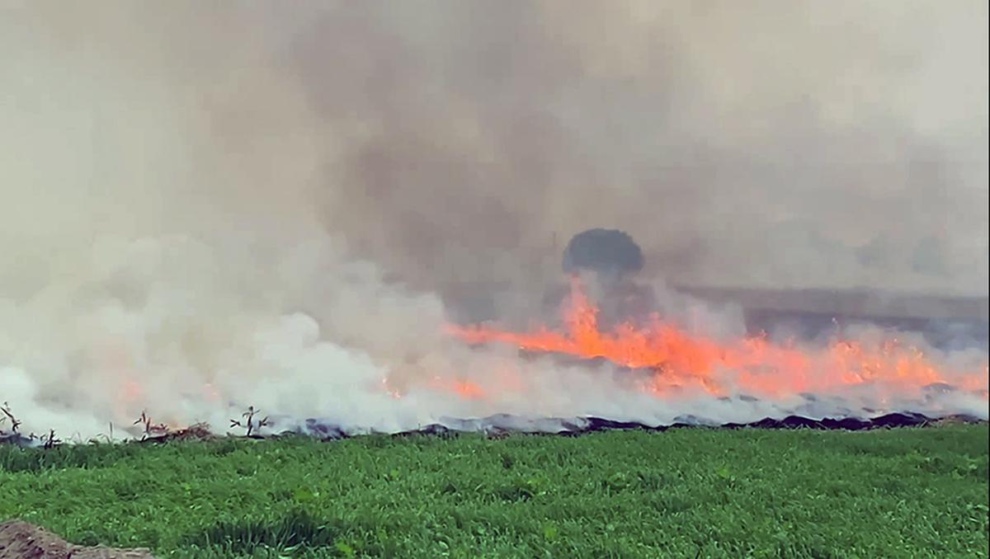The Supreme Court, while reiterating that it wants farm fires to stop, on Friday asked all stakeholders to follow the decisions taken in the meeting chaired by the Union Cabinet Secretary at its instance to devise ways and means to tackle the surge in air pollution affecting the national capital.
“We want farm fires stopped, we want air quality to get better, and we want long-term measures for crop replacement,” a three-judge bench presided by Justice S K Kaul said.
The bench, also comprising Justices Sudhanshu Dhulia and Ahsanuddin Amanullah, seemed unimpressed by the Delhi government’s defence of the odd-even scheme and said it only had “minimal impact” in reducing pollution levels. Leaving the task of controlling farm fires to the states and the Centre, Justice Kaul cautioned that if they don’t, “we will summon the chief secretaries and keep them here till they find a solution. I’m sure they will work better in their own offices. So please find a solution”.
The Supreme Court, while reiterating that it wants farm fires to stop, on Friday asked all stakeholders to follow the decisions taken in the meeting chaired by the Union Cabinet Secretary at its instance to devise ways and means to tackle the surge in air pollution affecting the national capital.
“We want farm fires stopped, we want air quality to get better, and we want long-term measures for crop replacement,” a three-judge bench presided by Justice S K Kaul said.
The bench, also comprising Justices Sudhanshu Dhulia and Ahsanuddin Amanullah, seemed unimpressed by the Delhi government’s defence of the odd-even scheme and said it only had “minimal impact” in reducing pollution levels.
Leaving the task of controlling farm fires to the states and the Centre, Justice Kaul cautioned that if they don’t, “we will summon the chief secretaries and keep them here till they find a solution. I’m sure they will work better in their own offices. So please find a solution”.
Hearing a batch of petitions in the matter on November 7, the SC had asked the Union Cabinet Secretary to call a meeting urgently on Thursday with all stakeholders. On Friday, the bench noted in its order that “Attorney General R Venkataramani submits that the meeting held under the chairmanship of the cabinet secretary has prescribed certain immediate steps to be taken…” and directed that “those steps should be proceeded with by all stakeholders”.
It said that “there are certain suggestions made in the course of the hearing and the concerned authorities will look into it. Among the suggestions which we can easily flag is that there is technology available now information is forthcoming to be utilised to control the farm fires, where the exact location of farm fires can be immediately located.
How to proceed with it and what measures are to be taken are administrative in character. The function of the court is to make sure that the administrators perform the task assigned to them. The methodology has to be by the administrators”. The bench also said orally that the Union Cabinet Secretary “will continue to monitor” the situation.
‘Replace paddy with different variety, another crop’
The SC said that the only long-term solution was to replace the current variety of paddy that was being sown with a different variety or another crop.
“The main problem is the time of sowing. And the variety which is permissible. If you feel a particular variety is causing a problem, ban the variety as far as I am concerned. Your decision. Ban it, restrict it, do whatever you want,” said Justice Kaul.
In its order, the court said that this, however, should be “done in a phased manner and discourage crops which do not leave such a stubble which is required to be removed”. On November 7, the court had termed the odd-even scheme “optics”.
On Friday, Senior Advocate Meenakshi Arora told the bench that studies had shown that the scheme had brought down PM 2.5 levels by an average 13 per cent at a particular time of the day. She added that though “odd even may not have a very large effect, it does have a certain percentage effect”.
Justice Kaul, however, pointed out as per report of pollution control authorities, “total vehicular pollution is 17 percent. Rest is others. Out of this 17 per cent also, you are saying that during a particular time period, there is a decline of 13 per cent of this 17 per cent. Therefore possible the amicus curiae said…it’s not really effective. That’s the position. What you have to do, you have to do. We are not here to tell you what to do”.
‘Don’t tell us what you should do’
The judge added, “you have to take a call, Tomorrow you will say we told you to continue, not continue…You do what you want. What the amicus said, we have flagged. What you have to do, you do. Don’t tell us what you should do. But we are only flagging it that this is the minimal impact of it. You want to do it, you do it, whatever you want to do”.
Responding to Arora’s submission on regulating app-based taxis registered in other states, Justice Kaul said, “Don’t try to non-perform and shift your burden onto the court. This is what is happening. Amicus is saying odd-even is not working, You are saying we will implement it also on taxis. Did we ask you to?”
On the last date of hearing, the court had pulled up the Punjab government for failing to stop farm fires. On Friday, Punjab Advocate General Gurminder Singh said the state government had “brought down the number by one-third in the last three days”. He said “police officers responsible to the SHO are taking fire brigades, water dispensers, and other materials to extinguish the fires the moment they are detected. We are also registering first information reports…”.
Singh added that 51 FIRs had been registered and Rs 1.3 crore realised in fines. Justice Kaul, however, said “you will register FIRs, they will be withdrawn. This is again a political issue”.
‘What is being done apart from waiting for rain?’
Pointing out that a carrot and stick policy was needed, Justice Kaul said, “We want to know what is being done about the farm fires, apart from waiting for rain. There must be an incentive for switching over from the variety of paddy currently being cultivated. But, carrot and stick both must be there. It should be monetised but there has to be a punitive element in the policy. For instance, anyone who uses farm fires will not get subsidies…something like this will have to be done. You do it however you want. we are not saying follow this solution, or that”.
He added, “…we are leaving it open because otherwise tomorrow you’ll say that the Supreme Court asked you to attach property. We want farm fires stopped, we want air quality to get better, and we want long-term measures for crop replacement. All governments are responsible. It’s your business how it occurs”.
Amicus curiae Senior Advocate Aparajitha Singh said the farmers were a sensitive constituency and “no government wanted to touch” them. Justice Kaul responded that “farmers are part of society… They also ought to be a little more responsible. And maybe we are also to be responsive to whatever their problems are. It’s a two-way track”.
The Punjab AG also clarified that the state had not asked for withdrawing MSP for rice but only said that it should instead be given to other crops or varieties of paddy. The bench recorded this in its order, saying it was clarified by the AG that his submission was “to encourage” the court’s concerns on crop replacement “and not to abolish the MSP forthwith on paddy.”
Source: The Indian Express
















